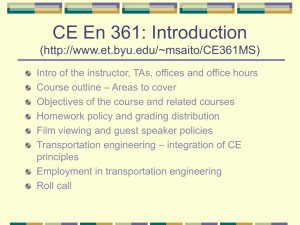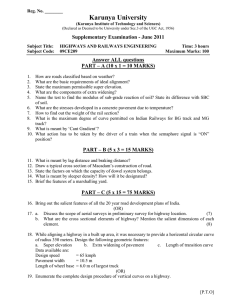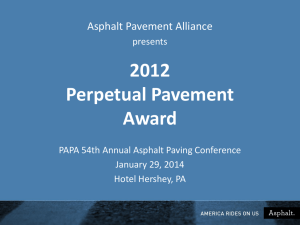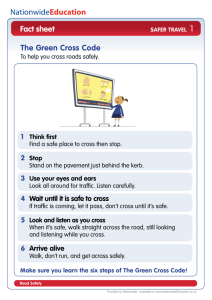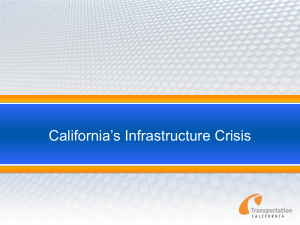ABO-HASHEMA MOSTAFA Course Topics Egypt and Bulgaria
advertisement
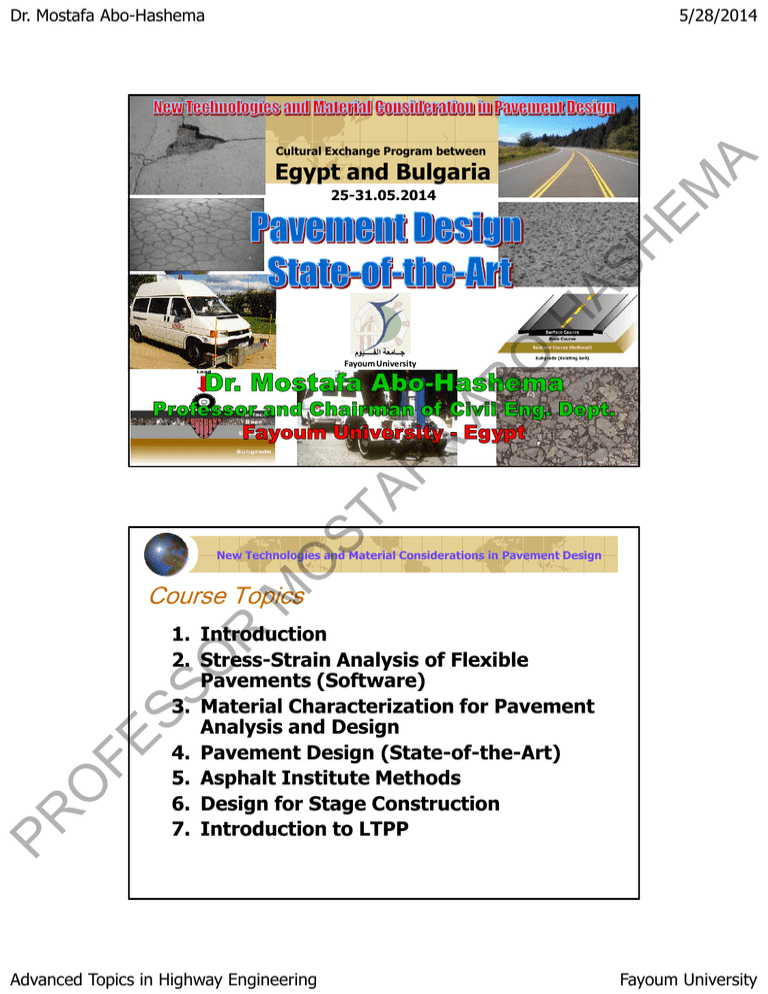
Dr. Mostafa Abo-Hashema 5/28/2014 O 25-31.05.2014 -H AS H EM Egypt and Bulgaria A Cultural Exchange Program between ST AF A AB Fayoum University O New Technologies and Material Considerations in Pavement Design M Course Topics PR O FE SS O R 1. Introduction 2. Stress-Strain Analysis of Flexible Pavements (Software) 3. Material Characterization for Pavement Analysis and Design 4. Pavement Design (State-of-the-Art) 5. Asphalt Institute Methods 6. Design for Stage Construction 7. Introduction to LTPP Advanced Topics in Highway Engineering Fayoum University Dr. Mostafa Abo-Hashema 5/28/2014 Empirical methods based on -H AS H EM Types of Pavement Design Approaches A New Technologies and Material Considerations in Pavement Design Strength test (CBR) Classification (soil classification) Regression methods based on Road Tests O Mechanistic-Empirical (M-E) methods 3 ST AF A AB Mechanistic model predicts stresses, strains, deflections Regression models to predict pavement life O New Technologies and Material Considerations in Pavement Design M Current Design Methods PR O FE SS O R AASHTO Method The Asphalt Institute Method for Flexible Pavements Portland Cement Association (PCA) Method for Concrete Pavements Texas DOT Method Other methods 4 Advanced Topics in Highway Engineering Fayoum University Dr. Mostafa Abo-Hashema 5/28/2014 New Technologies and Material Considerations in Pavement Design 5 ST AF A AB O -H AS H EM A AASHTO Road Test (late 1950’s) PR O FE SS O R M O New Technologies and Material Considerations in Pavement Design 6 Advanced Topics in Highway Engineering Fayoum University Dr. Mostafa Abo-Hashema 5/28/2014 7 ST AF A AB O AASHTO Design Equation: -H AS H EM Current Design Methods, continued… A New Technologies and Material Considerations in Pavement Design O New Technologies and Material Considerations in Pavement Design M Current Design Methods , continued… SS O R The current design methods in most countries in the world have relied mostly on: PR O FE Empirical correlations with past performance, Index-value-based characterization of material properties such as the layer coefficient, R-value or the California Bearing Ratio (CBR-value), Engineering judgment for design strategy selection. 8 Advanced Topics in Highway Engineering Fayoum University Dr. Mostafa Abo-Hashema 5/28/2014 -H AS H EM Current Design Methods, continued… A New Technologies and Material Considerations in Pavement Design Generally, Empirical approach requires a number of observations to be made in order to ascertain the relationships between input variables and outcomes. O It is not necessary to firmly establish the scientific basis for the relationships between variables and outcomes. 9 ST AF A AB It is not prudent to use empirically derived relationships to describe phenomena that occur outside the range of the original data used to develop the relationship. O New Technologies and Material Considerations in Pavement Design O R M Current Design Methods, continued… PR O FE SS These limitations make the empirical design approach obscure and difficult to apply. 10 Advanced Topics in Highway Engineering Fayoum University Dr. Mostafa Abo-Hashema 5/28/2014 -H AS H EM Mechanistic-Empirical Design Approach A New Technologies and Material Considerations in Pavement Design 11 ST AF A AB O A M–E design method for a flexible pavement means application of the principles of engineering mechanics to evaluate the response of pavement structures to traffic loading and much improved design methods to carry out distress prediction or how performance changes with time. O New Technologies and Material Considerations in Pavement Design PR O FE SS O R M M-E Design Approach 12 Advanced Topics in Highway Engineering Fayoum University Dr. Mostafa Abo-Hashema 5/28/2014 New Technologies and Material Considerations in Pavement Design -H AS H EM A Pavement Performance 13 ST AF A AB Roughness (often called "smoothness") Surface distress Structural evaluation Skid resistance (Safety) O Today, pavement performance is largely defined by evaluation in the following categories PR O FE SS O R M O New Technologies and Material Considerations in Pavement Design 14 Advanced Topics in Highway Engineering Fayoum University Dr. Mostafa Abo-Hashema 5/28/2014 New Technologies and Material Considerations in Pavement Design N f FSF f1 t f2 E1 f 3 -H AS H EM Fatigue Cracking Model A Performance Prediction Models O The factor f1 for actual pavements should be much greater than that for laboratory specimens due to the fact that wheel loads on actual pavements are not applied at the same location and there are longer rest periods between load applications, both of which increase the fatigue life. AB Rutting Model N f f 4 v A f5 ST AF 15 O New Technologies and Material Considerations in Pavement Design PR O FE 1 2 3 4 5 6 7 8 9 10 Fatigue Coefficients Rutting Coefficients Procedures (Models) f1 f2 f3 f4 Arizona DOT Austin Research Engineers (ARE) Belgian Road Research Center (BRRC) CHEVRON (Not Available) Federal Highway Administration Illinois DOT SHELL Research The Asphalt Institute (AI) Transport and Road Research Laboratory U.S. Army Corps of Engineers 9.33E-07 9.73E-15 4.92E-14 3.84 5.16 4.76 0 0 0 (Not Available) (Not Available) SS No. O R M Fatigue and Rutting Coefficients Used by Various Agencies (Not Available) (Not Available) (Not Available) 7.56E-12 5.00E-06 0.0685 4.32E-03 1.66E-10 497.156 0 0 2.363 0.854 0 2.665 4.68 3 5.671 3.291 4.32 5 f5 (Not Available) (Not Available) 3.05E-09 1.34E-09 4.35 4.484 (Not Available) (Not Available) (Not Available) (Not Available) 6.15E-07 1.37E-09 1.13E-06 1.81E-15 4 4.477 3.57 6.527 16 Advanced Topics in Highway Engineering Fayoum University Dr. Mostafa Abo-Hashema 5/28/2014 New Technologies and Material Considerations in Pavement Design Material Properties Environmental Factors Analysis Pavement Structure AB O Axle Loadings -H AS H EM A M-E Design Process 17 ST AF A Distress Prediction O New Technologies and Material Considerations in Pavement Design O R M Mechanistic Models PR O FE SS Flexible Pavement Response Two-Dimensional Layered Elastic Model Example of Computer Programs:ELSYM5, KENLAYER, WESLEA, CHEVRON, JULEA, and BISAR Three-Dimensional Finite Elements Model Example: EverFlex Program 18 Advanced Topics in Highway Engineering Fayoum University Dr. Mostafa Abo-Hashema 5/28/2014 New Technologies and Material Considerations in Pavement Design -H AS H EM P A Layered Elastic Model, Inputs H1 H2 E1 , n 1 H3 E2 , n 2 19 ST AF A En , n n AB O E3 , n 3 O New Technologies and Material Considerations in Pavement Design PR O FE SS O R M Layered Elastic Model, Outputs 22 Advanced Topics in Highway Engineering Fayoum University Dr. Mostafa Abo-Hashema 5/28/2014 New Technologies and Material Considerations in Pavement Design -H AS H EM A Damage Analysis For Fatigue 4 N ( future)i i 1 N ( allow)i SDR future 1.0 N ( future)i i 1 N ( allow)i 1 23 ST AF A SDRrutting AB 4 O For Rutting O New Technologies and Material Considerations in Pavement Design O R M Environmental Effects Asphalt Bound Materials Unbound Materials, Subgrade Soil, Granular Base & Subbase PR O FE SS Temperature and Moisture The effect on Elastic Modulus value of an unbound layer may be represented by a multiplying factor, called Seasonal Adjustment Factor (SAF). 24 Advanced Topics in Highway Engineering Fayoum University Dr. Mostafa Abo-Hashema 5/28/2014 New Technologies and Material Considerations in Pavement Design -H AS H EM Resilient Modulus (Mr) for subgrade is the main factor in pavement design. It changes with surrounding environment changes such as moisture and temperature. It is important to address the seasonal moduli in the design process. Winter Fall Mre = Effective AB Summer Freezing (Snow) O Mr A Effective Subgrade Resilient Modulus in AASHTO 1993 Spring A Raining ST AF Season O New Technologies and Material Considerations in Pavement Design M Effective Subgrade Resilient Modulus - Cont’d O R Mre is an equivalent modulus that would result in the same damage of seasonal modulus values. u f 1.18 108 M re2.32 SS (uf = relative damage) FE Example PR O Month Jan. Feb. Mar. Apr. May Mr(subgrade), 15900 27300 38700 50000 psi Relative Damage (uf) 0.02 0.01 u f June 900 1620 0.00 0.00 16.52 4.22 25.30 2.11 1.18 108 M re2.32 Advanced Topics in Highway Engineering July 2340 Nov. Dec. 3060 4500 4500 1.80 0.97 Average(u f ) log( Aug. Sept. Oct. 3780 4500 0.59 0.39 0.39 0.39 25.30 2.11 12 2.11 ) 2.32 log( M re ) Mre = 2185 psi 1.18 108 Fayoum University Dr. Mostafa Abo-Hashema 5/28/2014 New Technologies and Material Considerations in Pavement Design u f 1.18 108 M re2.32 (uf = relative damage) Example Mr uf Period Fall 5000 0.3 3 Winter 30000 0.005 4 Spring 2000 2.6 2 Summer 6000 0.2 3 f Y Average(u f ) 0.005*4 O 2.6*2 0.2*3 Y 0.56 12 Mre = 3870 psi ST AF 0.56 1.18 108 M re2.32 0.3*3 A u Uf * Period AB Season -H AS H EM A Effective Subgrade Resilient Modulus - Cont’d PR O FE SS O R M O New Technologies and Material Considerations in Pavement Design 28 Advanced Topics in Highway Engineering Fayoum University Dr. Mostafa Abo-Hashema 5/28/2014 29 ST AF A AB O -H AS H EM A New Technologies and Material Considerations in Pavement Design PR O FE SS O R M O New Technologies and Material Considerations in Pavement Design 30 Advanced Topics in Highway Engineering Fayoum University Dr. Mostafa Abo-Hashema 5/28/2014 31 ST AF A AB O -H AS H EM A New Technologies and Material Considerations in Pavement Design PR O FE SS O R M O New Technologies and Material Considerations in Pavement Design 32 Advanced Topics in Highway Engineering Fayoum University Dr. Mostafa Abo-Hashema 5/28/2014 New Technologies and Material Considerations in Pavement Design -H AS H EM A Traffic Data 33 ST AF A AB O No more ESAL’s! Traffic input will be number of axles by type and weight Same type and quality of raw traffic data currently used to compute ESAL’s M O New Technologies and Material Considerations in Pavement Design PR O FE SS O R T h a n k Y ou 34 Advanced Topics in Highway Engineering Fayoum University
